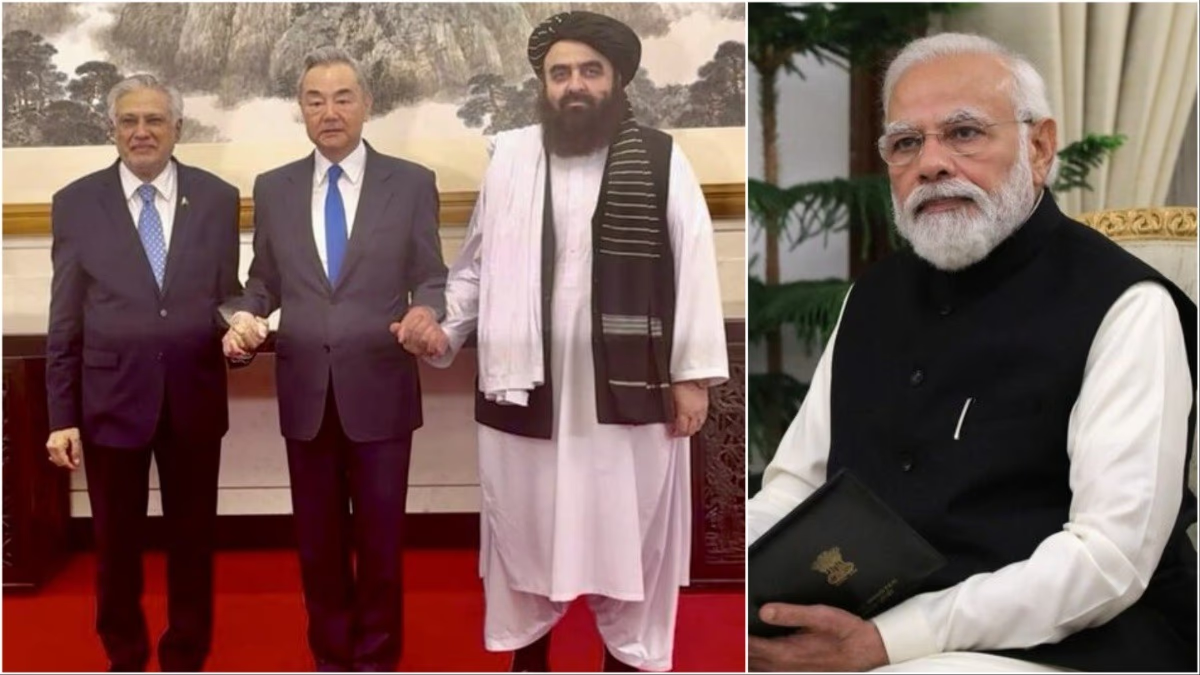In the wake of the Pahalgam terrorist attack and the escalating tensions between India and Pakistan, China has coaxed Afghanistan onto its development bandwagon. Under its ambitious Belt and Road Initiative, China has been orchestrating the China-Pakistan Economic Corridor (CPEC) in Pakistan, and now Afghanistan has been maneuvered into joining this project.
The revelation of Afghanistan's inclusion in CPEC followed a trilateral meeting between Pakistan's Deputy Prime Minister and Foreign Minister Ishaq Dar, Chinese Foreign Minister Wang Yi, and Afghanistan's Acting Foreign Minister Ameer Khan Muttaqi. A photograph emerged showing the trio in a symbolic gesture, holding each other's hands.
A statement from Pakistan's Foreign Ministry announced, 'All three nations have committed to enhancing collaboration under the Belt and Road Initiative (BRI) and agreed to the expansion of CPEC into Afghanistan。
On a three-day visit to China, Pakistani Foreign Minister Dar stated that this meeting marks a significant stride towards development and peace.
A strategic timing for China, Pakistan, and Afghanistan's trilateral talks
This sensitive meeting occurred shortly after India's retaliation against Pakistan for a highly publicized terrorist incident in Pahalgam. The strike was a response to the killings of 26 individuals, which led India to target nine terrorist camps in Pakistan and Pakistani-occupied Kashmir, resulting in prolonged conflict between the two nations.
Pakistan employed Chinese weaponry in its counteractions against India. Amid these heightened tensions, China has vocally supported Pakistan's sovereignty.
Afghanistan joining the Chinese-led project amidst these circumstances poses a potential strategic threat to India.
The implications of Afghanistan's involvement with CPEC on India
China first proposed Afghanistan's involvement in CPEC back in December 2017. The proposal involves constructing a motorway stretching from Peshawar, Pakistan to Kabul, Afghanistan.
After receiving Afghanistan's agreement, five rounds of discussions have occurred between the foreign ministers of these three nations. Pakistan's Foreign Ministry has indicated that the sixth trilateral meeting is due to take place soon in Kabul.
India has consistently opposed CPEC, citing it as a breach of its sovereignty and regional integrity, as the corridor traverses territories under illegal Pakistani occupation.
India's contention is that any country aligning with the CPEC project will only bolster these unlawful territorial claims, contrary to India's sovereignty.
Risks to India's security and regional interests
The extension of CPEC from China and Pakistan into Afghanistan bears troubling implications for India's security strategy and regional interests. Afghanistan becoming part of CPEC could afford Pakistan a strategic edge that deeply threatens India's current stake in regional affairs.
The Pahalgam attack starkly highlighted the peril of terrorism instigated by Pakistan, and the fusion of Afghanistan with CPEC could exacerbate such threats to India.
Impact on India's development projects in Afghanistan
India has been at the forefront of Afghanistan's development landscape, investing over $3 billion. Its contributions span road construction, power plants, dam building, parliament structures, rural advancement, educational ventures, and infrastructural projects. Should Afghanistan integrate into CPEC, China is poised to supplant India as the primary development partner, diluting India's influence and potentially diverting significant development projects.




